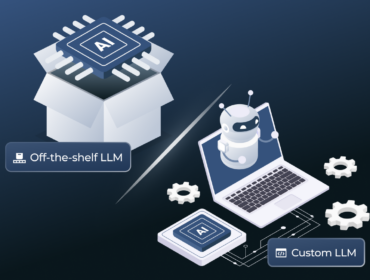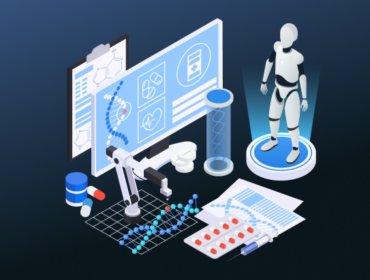Data is king in the informational age. Every decision and strategy is backed up by collected data. Business intelligence and data science are often referred to when speaking about the whats, whys, and hows of working with data. Though these two terms are often used interchangeably, there is a real difference between them.
Business intelligence and data science work with data to drive decision-making processes and solve specific problems. Data science and business intelligence specialists focus on making use of collected data.
The volume, variety, and velocity of data generated are increasing in complexity and require new approaches to data analysis. Business intelligence and data science are coming together to address these challenges. To leverage business intelligence and data science, you need to understand the key differences and how to handle both of them when working with the same data.
What Is Data Science?
Everything from client reviews to social media statistics falls under the blanket of “data”, and getting to the root of what it can do for a business is a real challenge. This is when and where data science enters the game.
Generally, data science is the field of study in which information is obtained from data collected via algorithms, scientific methods, and processes. It can also be defined as a set of mathematical tools, statistics, algorithms, and machine learning techniques that are used to uncover hidden patterns and insights. Note that data science is still developing as a field, and this definition is also evolving over time.
Data science uses the analyzed data to predict future trends and redefine present ones. For example, Netflix and Hulu leverage data science and machine learning algorithms to recommend what to watch based on a customer’s previous viewing history and personal preferences. The following mechanisms allow users to spend less time looking for what to watch and provide a unique and custom-tailored experience.
Businesses of various sizes and spheres can leverage data science to increase customer retention while also enhancing the ease of use of their products and predicting future trends.
What Is Business Intelligence?
Business Intelligence (BI) is a set of applications, tools, technologies, and processes used by businesses for data analysis. The primary goal of BI is to provide a clear understanding of all the data that is collected and turn it into actionable insights for further decision-making. First introduced as a method of communicating information across company units in the 1960s, today BI has transformed into a more advanced practice of data analysis with communication at its core. BI monitors the current state of business data and compares it against a company’s historical performance.
BI can help businesses analyze the successes and failures of a company and its competitors and learn from mistakes already made across their industry. BI tools can work with structured data like web statistics, emails, and marketing materials stored in data silos to get a full picture of the business environment.
While data science leverages AI and ML algorithms to process and analyze data, BI requires manual data analysis. BI offers a new way of analyzing data that has already been collected and dealing with the unknown.
Business Intelligence vs. Data Science: The Key Differences
BI and data science both play an important role in helping businesses produce valuable insights and predict future trends. So, where exactly is the line between these two disciplines? Where does data science end and business intelligence begin?
In fact, data science and BI differ in a number of ways, from the data type to project outcomes. Here’s what makes BI different from data science and vice versa.

BI and data science share the same mission statement – to reveal what data actually means. While BI analysts turn years of historical data into valuable insights that reveal trends and progression that a business can learn from, data science deals with real-time data to produce hypotheses about future trends and events.
In other words, data science can help determine future courses of action based on its forward-looking nature. BI aids the decision-making process based on past performance and events. The element of time distinguishes the two notions.
BI analysis cannot be performed without human intervention, which makes the insights and predictions somehow vulnerable. Data science leverages AI and ML to instantly react to events and changes in trends that in most cases, remove the need for human intervention.
When it comes to scope, the difference between business intelligence and data science is that BI offers a narrower scope of queries to work with, while data science offers almost unlimited scope for possible questions. But they are both used to drive decisions. BI finds patterns and trends in the collected data, while data science deals with unknown trends in the unknown data.
BI uses internal structured data to generate reports, while data science generates insights from collected data using complex predictive models and algorithms. Data science is much more complex than business intelligence.
Conclusion
Now that you’ve been able to sense the difference between data science vs business intelligence, we come to the conclusion.
Using data science and BI can provide greater insights and drive strategic decisions. Depending on whether you need to analyze your past performance (that’s BI) or predict future trends (that’s data science), knowing the difference between these two practices can allow you to get the best out of the data and bulletproof your business against any challenges in the present and future.
Businesses that work in consistent, long-standing markets may find that BI is enough to guide future decisions and prepare for anticipated challenges. For those highly volatile businesses that need to react to every market change, data science is just around the corner, offering enhanced and fact-based predictions about future trends.
At Unicsoft, we have been working in this field for over 15 years and certainly know the data science and business intelligence differences. If you don’t know which one will work best for your business or have already decided but not sure where to start, contact us and we’ll help you out!
FAQs
1. How do BI & data science drive decisions?
Data science uses real-time data insights to determine future course of action. Meanwhile, BI processes past performance and events based on pre-defined formulas to find current patterns and trends. Both help businesses make strategic decisions depending on their operating domain.
2. How do data science and business intelligence work together?
Business intelligence (BI) and data science play a complementary role in business decisions. On the one hand, data science applies statistical analysis, machine learning, and predictive modeling to extract insights from data. On the other hand, BI gathers this data and presents it through reports for stakeholders to monitor key performance indicators (KPIs), track metrics, and get a holistic view of the business.
3. Is business intelligence the same as data science?
No, they’re not the same. BI works with historical data that can be analyzed without human intervention and narrows down the scope of queries. Meanwhile, data science is much more complex than BI. It requires extensive programming skills to extract and analyze real-time data and derive future insights.
4. What to look for when choosing between BI and data science?
Consider your business requirements, data complexity, cost and time you have at hand, and long-term scalability.
BI may be sufficient for you if you have structured and well-organized data with relatively simple relationships, need insights into what happened and why, and are looking for something more accessible and affordable. However, if you deal with mountains of complex datasets, need real-time monitoring, and can afford to hire resources with expertise in programming and machine learning, data science should be your go-to option.
Reach out to us at Unicsoft to evaluate your options and get an expert consultation.





![Difference Between Business Intelligence vs. Data Science What’s the EU Artificial Intelligence Act and How to Comply? [Webinar]](https://unicsoft.com/wp-content/uploads/2024/03/Cover_1140_v1.1-370x280.png)

